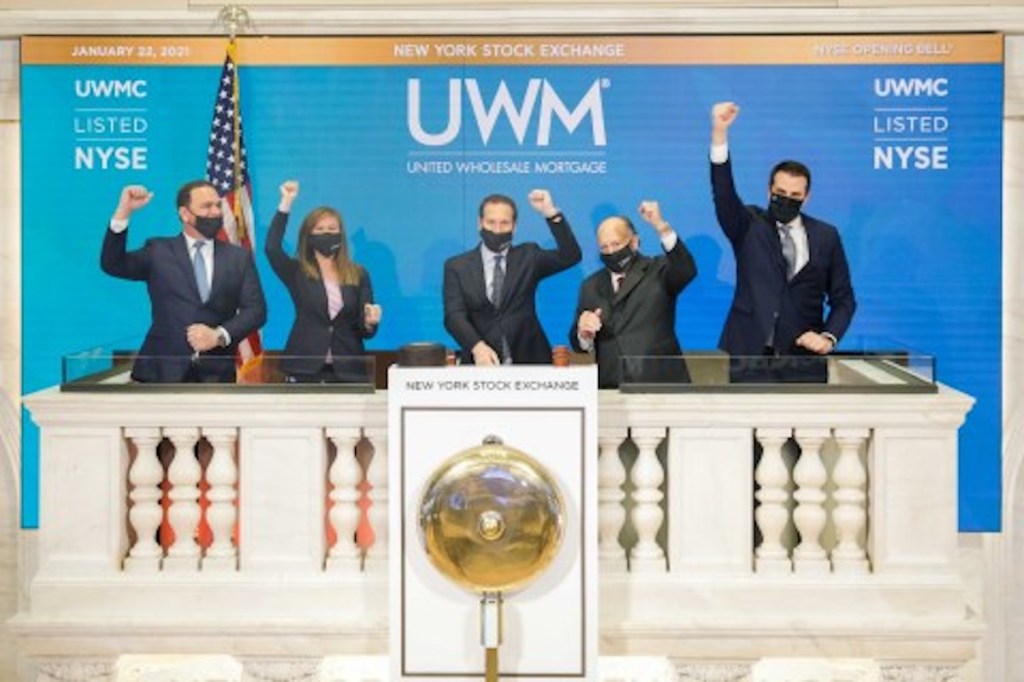After ringing the bell of the New York Stock Exchange on Friday morning, Mat Ishbia’s United Wholesale Mortgage (UWM) is a publicly traded company.
UWM, the second-largest mortgage originator in America, debuted trading at $11.95. By 10:45 a.m. EST, it was trading at $11.65.
UWM’s entrance to the public markets caps a wild six months for independent mortgage banks across America, in which a dozen large or mid-sized mortgage firms revealed plans to go public.
In many cases, the private equity backers of these firms have aimed to take advantage of a golden moment in mortgage banking, in which margins are fat, revenues are higher than ever, and interest rates are microscopic.
UWM, headquartered in Pontiac, Michigan, took a nontraditional route to becoming a public company.
How lenders will benefit from Black Knight’s acquisition of Optimal Blue
HW Media CEO Clayton Collins and Scott Happ, president of Secondary Marketing Technologies at Black Knight, discuss Black Knight’s acquisition of Optimal Blue and what the industry can expect from the company’s new Secondary Marketing Technologies division.
Presented by: Black Knight
It officially merged on Thursday with special purpose acquisition company Gores Holdings IV, giving the combined company a valuation of $16.1 billion. The merger injected $925 million into UWM to develop new technology and grow the broker channel, where it holds about 35% marketshare. UWM also raised $800 million in a debt offering in November, creating even more liquidity, reducing any reliance the firm might have had on credit lines.
The Ishbia family will retain 94% control of the company, which will likely eclipse 10,000 employees in 2021.
“I’m going to be extraordinarily focused times 10 on wholesale mortgage lending,” said Mat Ishbia, whose father Jeffrey founded the company in 1986. “We’re going to be helping growers grow, helping them succeed, educating consumers, investing in our technology, growing our tech stack to make it faster, easier and cheaper for brokers and customers.”
Ishbia didn’t rule out a strategic acquisition in the future. “I look at everything and I’m open minded but my extreme focus – and our leadership’s extreme focus – is being the best at one thing, not trying to be good at everything,” said Ishbia.
In the third quarter, UWM originated $54 billion worth of mortgages. The vast majority were vanilla 30-year fixed loans, but the company has launched a variety of new products and initiatives in recent months to boost its range of offerings to brokers. It also currently holds over $200 billion in MSR, when in the past it sold servicing rights to maintain cash flow and reinvest in technology.
The mortgage business is a notoriously challenging one, a cyclical business tied to rates and the 10-year yield. Margins are thin most years, and investors have typically been lukewarm or cold on mortgage companies.
Even Rocket Companies, easily the largest lender in America, posted a loss as recently as the second quarter of 2019.
The question remains whether UWM – or any of the lenders, for that matter – will be embraced by investors given the cyclicality of the business.
Analysts have expressed some optimism. In a note, JMP Securities analyst Steven DeLaney pointed out that the wholesale market generally fares better when rates tick up and the refinancing business slows.
“Wholesale margins are materially higher than those seen in the Correspondent channel, and we believe UWM’s approach is ideally positioned for both growth and profitability,” he wrote.
Henry Coffey, an analyst at Webush, wrote that UWM is primed to take advantage of the cycle. “We would argue that to move into this more elite camp, an independent mortgage company would need to bring to the table demonstrated success at generating consistent GAAP profitability, growth in market share within a respective channel, and some basic commitment to return of capital measures (we prefer dividends over buybacks…) UWM fits all three of these criteria,” Coffey wrote.
In interviews and speeches, Ishbia has maintained that he and the company were thinking long-term. It’s why he’s hellbent on growing the broker channel, which he says will swell as retail brokers make the switch in the coming years.
“We won this quarter, we’ll win the next one,” Ishbia said at AIME’s virtual conference in October. “What happens when [rates are] 4%? What happens when the markets change?”
James Kleimann is the Managing Editor of HousingWire. You can reach him at jkleimann@housingwire.com.






